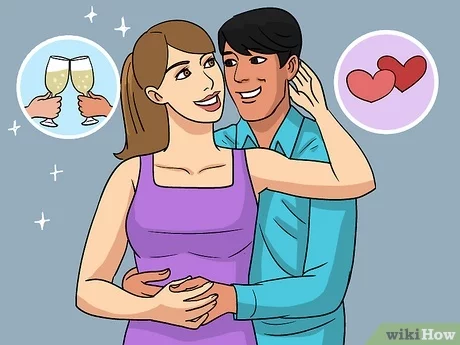Johnny Lee’s hit song “Looking For Love in All the Wrong Places” was famous as a teenager. It spoke about the hope and challenge of finding love, a message that still rings true today.
Many people desire to find love and intimacy. This must be challenging to manage. Potential daters face swipe-left-or-right dating apps that offer many choices but need guidance about making intelligent decisions or building a lasting relationships. Finding love can seem overwhelming when you consider the myths around it.
Logan Ury’s new book How to Not Die Alone – The Surprising Science that Will Help You Find Love is now available. Ury is the director of relationship science at Hinge. She explains romance’s pitfalls and offers advice on navigating the dating scene, creating better relationships, and keeping long-lasting partnerships. Her book contains interesting research, helpful tips, and relatable stories from the many people she has helped find love.
Greater Good talked to Ury about the dangers of dating and how to build a solid relationship. This is an edited transcript of our conversation.
Jill Suttie: What’s the most significant challenge people face when dating?
I have seen many people struggle with dating blind spots. They may have a pattern of behavior or a way of thinking that prevents them from being able to date. These are often obscure, but they can significantly impact how people date.
The romanticizer is the first. They believe that love is simple and that it is possible to find your soulmate. Romanticizers believe that if a relationship feels difficult, it is not with the right person. They give up and move on to the next person.
The second type is the “maximizer,” which sets unrealistic expectations for their partner. Maximizers always ask themselves, “Who is the other person?” Are you looking to be with someone 5% hotter? 5% more ambitious? 5% more interesting?
The “hesitator” is the last type. This is someone who sets unrealistic expectations and says that they are not ready to be a partner yet. I’m not yet lovable. “I need to improve myself before someone can love me.” People believe that one day they will be ready to start dating.
These patterns can be problematic because they are unrealistic.
How can one overcome these obstacles to finding love?
The most crucial thing for romanticizers is understanding that “happy ever after” is a fallacy and that finding someone is not the only tricky part. It can be challenging to build a relationship. It takes effort, attention, and continuous work. Someone who is a romanticizer must shift to the “work-it-out” mindset. If your relationship feels difficult, you are doing it right.
Maximizing is about realizing that you cannot date everyone and finding the best person. You can have high expectations. However, if you find someone who fulfills your expectations and makes you happy, you must commit to the relationship. They must overcome their “grass is always greener” tendency.
It’s not about being a hesitator. It’s about accepting that you won’t be able to find the right person for you suddenly. It is essential to determine who you are and how to date them. Hesitators have had to deal with the pandemic, which has given them yet another reason, not to date. Hesitators must understand that although the past year was challenging, it is essential to meet new people.
This seems like too much to ask for a hesitator. Can you recommend anything to someone hesitant about taking those first steps?
Many of my hesitant clients also attends therapy. Sometimes they must examine why they feel they aren’t lovable or believe love is conditional. They may have to accept that XYZ is not going to change. However, I have a list of steps they can follow to start dating.
A deadline is the first thing to do. Short deadlines have a lot of power. You might think, “I will start dating in three weeks.” You can then look at what is holding you back. You don’t have flattering but accurate photos of yourself. You make a plan to meet up with friends and take pictures. You might be nervous about meeting up for a virtual date. So, you practice it. It’s not impossible to break down overwhelming feelings into manageable parts.
Goal Visualization
I wrote in my book about a client who stated on the first call that he was obese and couldn’t have a relationship until he lost weight. He believed that he wouldn’t be loved unless he lost weight.
He needed to be able to date someone looking for love and not someone who would do that day. He didn’t have to lose weight; he just needed to let go of his self-limiting beliefs about being good enough.
How do you suggest someone who has overcome these obstacles and is ready to start a relationship?
I discuss in the book how we naturally see the negative side of people we are dating. For example, he split the bill instead of treating us, or he wore sandals and socks, or she made a terrible joke. A negativity bias is where we are more focused on people’s flaws.
But we can train our brains so that they focus on the positive. A “5 Good Things” exercise is one way. I ask my clients to text me after every date and tell me five things they like about the person they were with. It encourages people to see the positive in others and helps them to think more creatively about what makes them attractive. (If anyone reading this wants to participate, email me at 5goodthings@loganury.com after their next date.)
You write in your book that “instant chemistry” can make finding a life partner challenging. Isn’t it essential to have a sexual attraction in a relationship?
Sexual attraction is essential! The sexual attraction is important, but I don’t think you should ignore it. It would help if you did not place too much emphasis on instant chemistry. You can lead people astray by seeking that feeling of excitement and obsessiveness, where you feel like the only person in the room. This is because some people are very “sparky,” meaning they attract many people. They may be charismatic or attractive. Although you may feel something special between you, the truth is that sparky people tend to share that feeling with many other people.
People who reject potential partners simply because they don’t feel instant chemistry with them are making a mistake. Research has shown that attraction grows with time. This is called mere exposure–the more you spend time with someone, the more you will like them. This is why roommates and colleagues end up marrying or dating their roommates. You will appreciate their different aspects the more you are exposed to them.
It would help if you also recognized that you might be experiencing anxiety when you feel a connection with someone. This is the feeling of not knowing whether someone likes or dislikes you and wondering if you’ll call them. Helping people to rewire their thinking from “Oh, that guy is so exciting!” to “He makes it difficult for me to trust him.”
Instead of looking for an instant spark, focus on the slow burner. This person is reliable, kind, and thoughtful, genuinely who they claim to be. People can build long-lasting relationships by focusing on the slow burn.
After a while, you have been with someone; how do we decide whether we want to continue our relationship?
I didn’t expect to help people with their breakups. I am so passionate about helping people find love and keep it going. Assisting people to get out of relationships that don’t suit them is one of my favorite ways to help them find great ones.
People tend to stay in relationships for too long because they fear losing someone or worry about finding someone else. This is the “hitcher” type. Some people become so addicted to the thrill of falling in love that they jump from one relationship to another, never settling for anything less. This is the “ditcher” type. My clients often ask me if they should stay or leave. I look at their history to determine if they are a hitcher or ditchers.
I ask them to consider whether something outside of the relationship might make it difficult to get along right now. Are you and your partner experiencing depression? Are there little ones at home that make it difficult to get along? Every relationship has its highs and lows. Understanding that there are external factors that make it challenging to connect can give people an incentive to stay.
Sometimes, it is helpful to ask people questions such as, “Have I brought my best self to this relationship?” Are there other things you could do?
I ask my clients the “Wardrobe Test Question” sometimes. If your partner was a piece of clothing from your closet, what would it be? One client said her boyfriend wore a wool sweater that kept her warm but made her itchy, so I removed it. Another woman stated that her boyfriend is a t-shirt she would wear to work but needs to be more attractive to be helpful. This is abstract enough to allow people to see what’s happening and not try to convince them to change their minds. Understanding what is happening will enable you to make the right decision.













